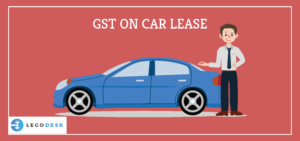GST on Car Lease
GST On Car Lease in India
Car lease in India is the flash in the Indian pan, with sudden success following a dead-end. Interestingly, the Central government in general and the GST Council in specific rob all the credits. Keeping this in mind, the article talks about the repercussions of the decision taken by the Central government to make GST applicable even to the lease of cars.
What is a car lease?
To briefly introduce the concept of car leasing, it is a mechanism which allows you to drive a car, without buying it or paying a huge sum. In other words, the lessee can avail every service of the car by paying monthly payments for the same. Such instalments shall be inclusive of the monthly rent of the car, insurance, maintenance, etc. Notably, there are two types of leasing models: operating lease and finance lease.
The current market for a car lease
In India, the market is juvenile yet constantly growing. It currently stands at the worth of Rs.1,500 crores and is estimated to progress at the progressive rate of 15-20 per cent. The important factor for the demand of car leases over car loans is the tax benefits and exemptions which the people get from the former. For instance: for a person purchasing a new car, around 20% of an additional cost of the car has to be paid towards GST along with a 15% cess charge. This swells the overall cost of any car, making it out of reaches of the masses. Contrarily, with the modern-day leasing system, a person can easily choose any car of his/her desire, pay merely a monthly rent and then again switch cars at a regular period to enjoy the fruits of versatility. Therefore, it can be safely concluded that a significant factor in the growth of this market is the exemptions in taxes which the individuals receive.
The GST Regime
With the recent decision by the GST Council to absorb this industry within its ambit has brought the industry and its tensed members at the crossroads yet again. This situation was encountered when the government administration suddenly decided to treat the lease as a good rather than a service. Coming to the numbers, the current market position is such that a monthly car lease would cost Rs.25,000. Additionally, a 12.5% VAT would bulge the cost to Rs.28,125. However, complexities arise when GST is imposed. This is more so because, with 28% GST and 15% Cess, the base price swells incredibly to Rs.33,750.
Consequences
Coming to the technical aspects, this would indirectly result in double taxation of the same good. This is more so because once a car is purchased, the central excise is already included and paid by the buyer. Now, with this recent change, the lessee will have to pay GST for leasing the same car on which the excise was paid (at time of purchase). Thereby burdening the buyer with the same tax twice.
Returning to figures again, Service agents such as Ola have stated that they are currently paying 14.5% VAT. When the GST is applied, these companies will have to pay the double amount, that is, around 29% to 43% on the already leased cars. This would increase not only the cost for the driving partners but would also result in them increasing the price of their services. This will follow a reduction in revenue, difficulty in the sustenance of business, and mass unemployment. Interestingly, the impact of this section will also negatively influence related sectors, such as the vehicle sector. This is so because a growing number of companies purchase vehicles with the sole purpose of leasing them, thereby acting agents. All in all, an economic slowdown must be expected for the leasing industry in specific and automobile industry in general.
The Aftermath and Conclusion
The consequences are manifold. To start with, the car leasing rentals are assuming a rise by approximately 25%-30% due to the new tax regime. This is likely and primarily to affect car rental giants like Ola and Uber, which have combined leased approximately 30,000 cars. Fearing such consequences, several lease companies such as Orix, Clix, LeasePlan, Ola Fleet Technologies, TranzLease, Uber, ALD, Tata Capital, Arval, and Tractor Manufacturers have filed a petition off late before the Central government seeking exemption from this double taxation mechanism which marks the death knell for the industry. The most recent development after the submission has been the statement by a government official that they are considering the proposal with utmost sincerity and will release their decision soon.
The road ahead shall be mostly dependent on what the GST council decides. Since revising the GST rates is not a viable option, the direct and precise question remains if the Council would reconsider its decision and remove the recently added GST over the lease on cars.
Try our Debt Resolution solutions today Request a Demo
